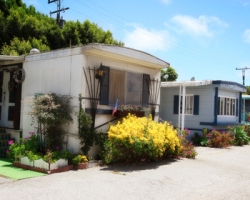Residents of Culver City’s two mobile home parks were left with bitter feelings and a deep sense of anxiety after the Redevelopment Agency chose not to include them in a planned project on the west side of the city six years ago. Removing them from the development project, which never materialized, left them vulnerable to losing their homes and entitled to only a minor recompense if the property owners decided to sell the parks.
But a new draft ordinance designed to give them added protection in the event of a sale could be the salve to assuage their worries.
The ordinance, which would amend Title 15 of the city’s municipal code, has been released to the public and at least two public meetings have been held to review the proposed municipal law. “We felt that this would be the best approach to facilitate public participation,” Culver City Assistant City Atty. Heather Baker told the News.
Councilman Scott Malsin has been waiting for such an ordinance after witnessing what happened to the residents from 4025 and 4071 Grand View Blvd. six years ago. He told the News in 2006, his first year on the council, that during his time on the city’s governing body that he would try to provide a legal protection strategy that would rectify what a prior city agency had done.
“It was a very contentious, very emotional time, and many residents of both mobile home parks were very unhappy about being displaced (from the development project),” recalled Malsin, who at the time was a city planning commissioner. “Many of them had voted to be included in the redevelopment project, and if the owners had decided to close the park and sell their property, the residents would have been in very bad shape.”
According to the 2011 California Mobile Home Residency Law, park residents must be given at least one year’s notice that the park where they reside will be closed to vacate the premises and they are also entitled to compensation. In 2005, the amount was approximately $5,000, according to the Culver City Community Development Department.
Inclusion in the planned development would have provided occupants of the Grand View mobile home parks with the opportunity to purchase affordable housing in the project or a much higher relocation payment.
That experience made Malsin determined to seek a solution that would be fair to both the property owners as well as the residents if a similar situation arises. The city has been attempting to bring in a developer for the corners of Washington Boulevard and Centinela Avenue in west Culver City since the deal with the Olson Co. fell through in 2006.
“It seems inevitable that eventually with more development these parks might close, so we wanted to craft something that did not create a burden on property owners that would eliminate the value of their property,” the councilman explained. “I also want to include better compensation, better general assistance and additional notice for the residents if the parks are closed.”
According to the draft ordinance, prior to any mobile home park owner’s decision to sell, change the use of or close the property, a relocation impact report must be completed and filed with the proper government authorities. The city council would have the right to approve or deny the application.
Park residents would be compensated according to the fair market value of their homes, and the council could also impose other modes of financial help in the form of relocation assistance. Owners could be responsible for the cost of relocating a resident or a family to another comparable park, moving homes that are equipped for relocation and compensation of first and last month’s rent at another park or alternative affordable housing, among other things.
If the park is to be redeveloped for residential use, the council could impose a requirement to set aside a certain number of affordable to low-income units on site or within city limits. If the park is converted into residential use, the city could request that eligible occupants be given the option to purchase first or rent at the existing site.
Baker said her office researched a number of different cities that have mobile home parks before crafting the proposed municipal law. “Huntington Beach was one of the cities that the city council seemed particularly interested in,” she said.
Malsin and Baker said the ordinance will likely be revised in minor ways before it ultimately is submitted for council approval. The councilman said he is also being very cautious to not inadvertently establish a legal provision that would create an opportunity for a developer to unfairly benefit if, for example, a portion of the zoning code would require amending.
“My goal is not to create any type of windfall for a developer or a property owner,” he stressed.
Sandra Luevano, a resident of 4025 Grand View Blvd., says there is still a sense of resentment among some of the mobile home park occupants stemming from the 2005 vote. She feels that the most interested parties of the proposed protections are in the neighboring mobile home park because she does not think that the current owners, Frank Teng and Ray Matsuoka, are not trying to sell their property where she lives.
“With the real estate market the way that it is, I don’t get the feeling from them that they want to sell right now,” said Luevano, a health food store manager.
Malsin wants the ordinance in place in case the owners one day decide they want to sell or redevelop their parcel. “I think that this is very thoughtful policy that Culver City can be proud of, and I think it fairly balances the rights of the property owners and the mobile home park residents,” he said.
Luevano still remembers the feelings that she and many of her neighbors felt leaving City Hall on Oct. 17, 2005, after the agency voted to exclude them from the Olson project despite their last minute decision to seek inclusion, which would have given them added benefits similar to those that are being proposed in the draft ordinance.
The 2005 agency, she said, “put us through all this rigmarole and then they left us out in the cold,” adding, “There is still some uncertainty and mistrust [toward City Hall].”
Malsin said he understands some of the residents’ concerns. “I was really confused with the agency’s vote,” he said. “After that very emotional and very anxious time, to ignore [the mobile home park residents] vote was very troubling.
“It really seemed like a case where ideology and personalities can get in the way of good policy.”
Under certain conditions in the draft ordinance, the owners of the mobile home parks may request an exemption from relocation assistance.
A community meeting will be held at the Grand View Palms assisted-living facility, 4061Grand View Blvd., next door to the mobile home parks on Thursday, July 7.
“Unlike other draft notices, we were not legally required to circulated this ordinance,” Baker noted. “We thought this was the best way to encourage public participation and we think this provides additional protection for the residents of the parks.”
“This has taken a long time to get to this point,” Malsin added. “I think this is an example of how government can learn from past missteps and learn to do things in a better way.”
Luevano plans to attend the July meeting. “I really want to see what they have in mind, and what they consider to be protection for us,” she said.













